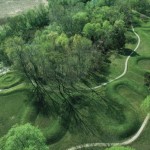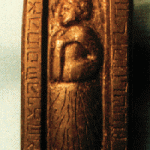As humans we tend to believe without question claims that support our beliefs or make us/our ancestors look good. These claims include that Indians were not the Moundbuilders, the Hebrew stones were real and Columbus discovered America.
Archaeology seeks to find the truth in these allegations. Despite popular belief, archaeology isn’t just digging in the dirt. Archaeologists work hard to find concrete evidence before coming to conclusions and they disregard their own bias to prevent tampered evidence.
Cyrus Thomas is a prime example of an archaeologist trying to find the truth. He only asked one question: “Were the mounds built by the Indians?” He went about answering this question by refuting five key claims that supported that the mounds weren’t built by Indians. Thomas disproved each claim with ample proof. Many people still ignore the evidence that keeps piling up supporting that Indians made the mounds because it conflicts with their preconceived notions of Indians as primitive and barbaric. If the Indians made the mounds, then the Europeans would look bad for almost wiping out a race that was impressive and civilized. They have a motive for believing that the Indians didn’t build the mounds. It’s important for archaeologists not to have any motives such as nationalism, money, fame, racism, and religion.
A claim relating back to the mystery of the mound builders was that they were descended from one of the Lost Tribes of Israel. The series of stones found to support this assertion
were a mix of ancient and modern Hebrew which led to skepticism. Eventually the hoaxers were caught. The whole motive behind this hoax was to prove that the native inhabitants of the old and new world were decedents from the Bible and could be traced back to the first people God had created. This was a religious motive.
The last example is the debate over who discovered America. We glamorize the fact that Columbus “discovered” America by celebrating Columbus Day. In reality, there’s no way that Columbus discovered America. We only celebrate it because we like to believe our ancestors are superior and successful. It’s obvious that someone else discovered America first because there were many civilizations living there when Columbus arrived. Although we aren’t sure who the first people were on America – whether it was the Vikings, migrants across the land bridge, the Clovis culture or even another group – there is no way it was Columbus.
Besides having an ulterior motive, all of these examples also dealt with identity. Your identity has something to do with your ancestors; what they do or who they are says something about you. This is why Europeans still don’t want to admit to killing a culture of civilized people or give up the idea that Columbus discovered America. It’s the reason people wanted the Hebrew stones to be real. Sometimes society might not like these identities, but archaeologists disregard that; they seek to find the truth.


